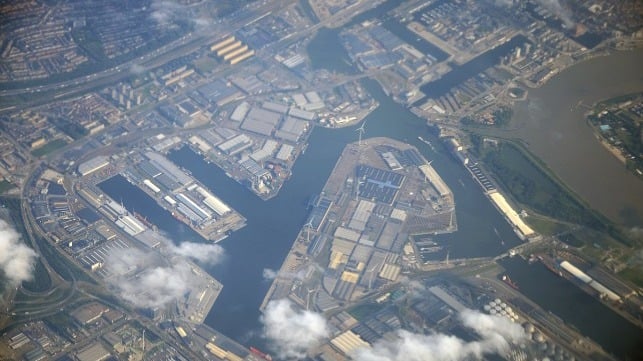Antwerp Highlights Challenges for Ports with Volumes Declines in 2020

The 2020 results for the Port of Antwerp highlight many of the challenges the ports confronted last year as well as the ongoing changes in the nature of the shipping industry. According to port officials, the results illustrate the resilience of the port and its ability to hold its position as well as highlighting the importance of investing in increased container capacity and new technologies.
The strength of the container market and the strong recovery in the second half of 2020 helped Antwerp to limit its overall decline in throughput for the year. Container throughput in the port has been breaking records for years now, and 2020 was no different. Recovering from the blank sailings and low volumes experienced in the first half of 2020, container volume exceeded 12 million TEU for the first time, a year over year increase of just over one percent.
"We are holding our position very well, moreover, a record in container throughput,” said Port Alderman Annick De Ridder. “The economic urgency for additional container capacity is thus more than ever demonstrated. With numerous innovative projects, we have reaffirmed our pioneering role. In 2021, we will continue this momentum with our submitted relaunch projects such as the pipeline network that can be a key in the energy transition and attention for the railways.”
While container volumes were strong in 2020, other segments of the business all reported declines in 2020. Global trade tensions combined with the effects of the coronavirus to produce a more than 16 percent decrease in conventional breakbulk volumes. Steel, one of the main components of this segment was hit particularly hard according to port officials.
Similar pressures were experienced in most of the other traditional categories a well. Coal volumes dropped after the winter in part due to the growing supply of green energy and reduced demand for coal and ores from the steel sector. Fertilizers, ores, sand, and gravel also all saw losses in 2020, while scrap volumes nearly held up. The result was a 17 percent decrease in dry bulk throughput.
Liquid bulk fell by a total of just over four percent but crude oil throughput fell by nearly two-thirds due to reduced refining activities. Chemicals also saw a fall in demand due to reduced activity with only oil derivatives recovering to post a better than a three percent increase in 2020.
Lockdowns, job losses, and travel restrictions all impacted the automotive markets and manufacturing in 2020. While total ro-ro volumes were down by nearly 10 percent, the volume of new autos fell by twice that or more than 20 percent and second-hand car volumes were off by 22.5 percent.
The result of all these market pressures was a better than three percent decline in total throughput at the Port of Antwerp in 2020. The port handled just over 230 million metric tons in 2020. In 2020, 13,655 seagoing vessels called at Antwerp, representing a 5.1 percent decrease compared with 2019 with the total gross tonnage of these vessels declining by a similar percent to 394 million tons.

that matters most
Get the latest maritime news delivered to your inbox daily.
Despite the challenges, Antwerp reports that it made progress in terms of greener energy, digitalization, and mobility through various projects and that it will continue its focus on sustainable growth, targeted transition, and resilience. They believe that the investments in energy transition, digitalization, and mobility are providing a foundation for a sustainable future.
“It will not be smooth sailing in 2021 nor will it be predictable, but we are stronger than before,” said Jacques Vandermeiren, CEO Port of Antwerp: Despite the crisis, we were more forward-looking than ever in 2020, in terms of energy transition, mobility, and digitalization. I am convinced that our ambitious projects, such as the CO2 reduction project Antwerp@C, the hydrogen coalition, the digital encryption of containers with the "Certified Pick up" project, and the new development of the NextGen District on the old Opel site will be major game-changers within the next 10 years.“
